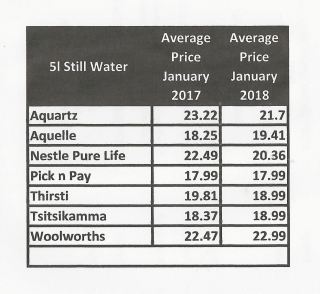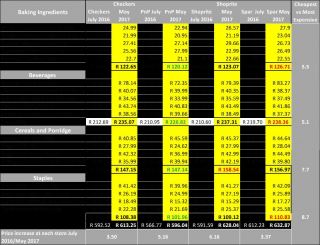Water Watch 2
The website Retail Price Watch, the consumer price watchdog, which has been tracking the price of bottled water in supermarkets in the Western Cape, says that although prices in the major chains have not generally risen over the past week, the major issue remains shortage of supply.
“Bottled water manufacturers in the Eastern Cape and KZN have confirmed that they are racing against the clock to supply the unprecedented demand for 5l bottled water in the Western Cape.
“However, when water does become available, it is swept off the shelves within an hour, even though most stores are limiting the quantities available to each customer.
Baker confirmed that today (1 February) at least two Woolworths and two Checkers in the Southern suburbs had no supply.“Pick n Pay Online is advertising 5l Aquartz in quantities limited to 12 bottles, but several people have reported that stock is not available.
“The Western Cape shortage is having a ‘knock-on” effect in many ways: stores in Port Elizabeth have also been selling out fast with Checkers and Shoprite only able to supply 5l bottled water sporadically over the past few days.
“Although Port Elizabeth is facing severe water restrictions, it has not yet named a “Day Zero” so one can only assume that people are stocking up in order to be better prepared in the event of a Cape Town scenario.
“Plastic bottle manufacturers in Gauteng are also experiencing greatly increased demand. Companies in the Western Cape which use 5l and 25l bottles for purposes other than water are finding their businesses affected by lack of supply in the Western Cape and so are turning to Gauteng.
“Plastic bottle manufacturer Blowpet in Bronkhorstspruit says that in addition to orders from businesses in the Western Cape some companies, NGOs and private individuals in Gauteng are buying 5l bottles, filling them at assembly points, and then donating them to various institutions in Cape Town
.“It is difficult to gauge the impact on the environment in Cape Town of all the plastic that is flowing in to the city. In the short term people will probably hang on to their 5l bottles with the intention of refilling them at water points but discarded bottles will add to the already critical plastic waste pollution on our shorelines’ says Baker.
“Plastic does not degrade and if burnt it gives off toxic fumes. Perhaps it is time for the big supermarkets and/or plastic recyclers to come to the party and in good time start offering accessible recycling points around the peninsula before the plastic overflow becomes yet another Cape Town crisis.”
What you should be paying for water if you can get it:*
- Aquartz R17 - R22
- Aquelle R19 - R20
- Nestle Pure Life R18 - R23
- House Brand R15 - R18
- Tsitsikamma R17 - R19
*Based on current prices in the Western Cape where available and prices around the country
“Consumers who feel water is being overpriced or that they are being otherwise unfairly treated can write to This email address is being protected from spambots. You need JavaScript enabled to view it. . While we cannot promise redress, we will make every attempt to investigate the matter and bring it to the attention of the authorities, “says Baker. “Only email queries will be attended to. “
Issued by Viccy Baker This email address is being protected from spambots. You need JavaScript enabled to view it.
Water Watch in Cape Town
The prolonged drought in the Western Cape and the threat of “Day Zero” has given rise to fears of price hikes in bottled water yet Retail Price Watch, the consumer price watchdog, has found that major retail chains in the region are sticking to 2017 prices for 5l bottled water.
The net effect is that there has been a rush on bottled water and many stores have found themselves temporarily out of stock, says Viccy Baker of Retail Price Watch.
“Under normal circumstances demand pressure would have increased the price of the larger sizes, but instead stores have been offering specials which have cleared their shelves, even if only for a short time,” she says.
“Retailers are to be commended for not capitalising on the shortage although it is very likely that consumers who are already very angry about the way the water crisis in the Western Cape has been handled, would not tolerate large price hikes,” she says.
“On 25 January Woolworths in the Southern suburbs of Cape Town which sells its house brand for R22/5litres, was offering 2 bottles for R31 and the shelves in most stores were cleared before lunchtime.
“Pick n Pay and Checkers Blue Route were out of stock but promising deliveries on 26 January while Checkers Muizenberg is selling its house brand Eastern Highlands for R15 a bottle.”
Judy Woodgate of Tstsikamma Crystal Water in the Eastern Cape says that demand has been “unprecedented” with her sales managers witnessing people fighting over the last bottle of water on shelves in supermarkets in Cape Town.
“We have been besieged not just by retailers but by members of the public who want to buy at source because they cannot buy from the stores,” she said.
“We are bottling as fast as we can and have an order book which will fill 31 trucks all headed for Cape Town in the next week.”
Woodgate offers a caution to homeowners wanting to buy large quantities of water – many opting for truckloads of more than 5000 litres - that storage in the sunshine can offer water deterioration over time.
Baker says that empty 25l plastic bottles have been sold out at stores such as Mambo’s and Plastic World.Monique Hector, a spokesman for Mambo’s confirmed that the Cape stores had experienced increased demand and had sold out. “We are expecting deliveries but cannot say when.”
Baker says that over the past year prices of 5l bottled water around the country have generally stabilised (see Table below).
A Muizenberg resident Heather Hirschman (57) who lives on the 10th Floor of her apartment block said the 87 litres per day that Capetonians had been allowed over the past few months was far too much given the current crisis and that the authorities should have acted earlier to restrict the use of water further and to hike the price for higher levels of water usage. “It is inconceivable that older or disabled people will be able to manage to carry 50 litres of water per day from taps to their homes,” she said.
Checkers vs Pick n Pay vs Shoprite vs Spar in 2017
In 2016 independent consumer website Retail Price Watch conducted a survey of prices across South Africa’s seven biggest chains in four different categories. The items surveyed were national brands which were selected solely on the basis that they are available from all stores.
This year the comparison was slightly truncated because the same brands were not available at all stores: nevertheless the four “big name stores” are still represented.The chains were Checkers, Pick n Pay, Shoprite and Spar. The categories were baking ingredients, beverages, cereals and porridge, and staples.
The average price of each item in May from stores around the country was used in order to ensure that a single “special” did not unduly weight the overall price of the item.
Pick n Pay proved cheaper than the other three stores in all categories, although by a narrow margin in the Cereals and Porridge category, with less than one cent separating it from its nearest rival Checkers.
“It is noteworthy that only cereal and porridge prices appear to have stabilised or slightly reduced since July last year, while others continue to rise,” says Viccy Baker of Retail Price Watch.
Spar as the most expensive was 5.5% higher than Pick n Pay in the Baking Ingredients category and 5.1% more expensive in the Beverages category. Shoprite was the most expensive in the Cereals and Porridge category, with Pick n Pay beating it by 7.7%. In Staples, Spar came out an average 8.7% more expensive than Pick n Pay.
“This survey is not a basket of goods but it does present a rare opportunity to compare apples with apples, something stores and suppliers are very keen to prevent consumers from doing.
“For example, Cremora dropped its 1 kg pack (surveyed last year) for an 800g pack. The price appears to be lower yet if you adjust the price back to the kilogram price, you will find out that you are paying more per gram for the 800 gram pack than you were for the kilogram pack – “shrinkflation” in action!
“An objective price comparison also provides a reality check in demonstrating that prices move in a very narrow band and are similar over time, no matter which store you buy from. It’s up to consumers to demand value for money and not be taken in by so-called special offers (you have probably been paying more than the average for the special over the past few months so that it will appear as if the price has dropped). “



